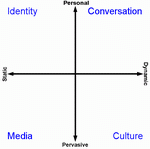i was tooling around the web, and finally wandered into joi’s space, where i found this.
apparently, joi’s been noodling. and thinking. i know from personal experience that this is a dangerous combination. please put on appropriate safety gear before proceeding.
i’m going to throw some wrenches into the works, based on the language if nothing else. it’s entirely possible we’ll end up talking past each other, but he did ask for comments (and unfortunately, my comment turned into a graphic, so it can’t really be a comment-comment, it’ll have to be a reference-comment).
IE low context is stuff like CD’s and books which don’t change, are worth approximately the same amount to most people and don’t have much timing or personal context.
i disagree with this. the first thing i’m going to do is split the concepts of “context” and “don’t change” – i think things that don’t change can have a lot of personal context, and a lot of [personal] value. “our song” doesn’t change, but is very context-rich. so are “my baby[‘s] pictures.”
The far right is very personal, very timing sensitive, high context information such as information about your current “state”
again, i think there’s a natural and important split here. to emphasize, “very timing sensitive” information isn’t necessarily personal. the first example that comes to mind is “evacuate” (see what happens when you live in a constant state of terror alert?). anyway, the point is that time-sensitive material could be incredibly relevant to one or a million people.
i’m going to avoid joi’s layers and mapping things to this space for now. i came up with this:

i’m not entirely comfortable with all the labels, but i think this generally reflects my view of “the space.”
probably one of the most important points i want to make with the graphic on the table is that things move through this space. they don’t just “appear” and “stick.” consider a transition from the “media” sector – a book or song or film is a static entity – but as it is “remixed” (quoted, parodied, rewritten, clipped, edited) it becomes more and more a part of the culture. “i’ll be back” rides a vector from “media” to “culture.” also consider the personal equivalent – the line from the first movie you saw on your first date with your soulmate – the one where you both looked at each other and it “clicked.” this becomes a touchstone in the relationship – and a vector from “media” to “identity.” (that is, the identity of the relationship).
finally, since joi did mention value, i think there’s also an important aspect to “content” here, and perhaps this leads to a third axis. there’s a range from “low content” (which might be an sms message) to “high content” (which might be a fully immersive experience). an important aspect of this axis is that “low content” can refer to “high content” if it has “high context” – that line from the movie can be a metaphor for the whole first-date experience – but only for the two of you who shared the context.
this was a quick post- time to rush out the door, but i’ll let the rest of you hack this apart while i’m out.
